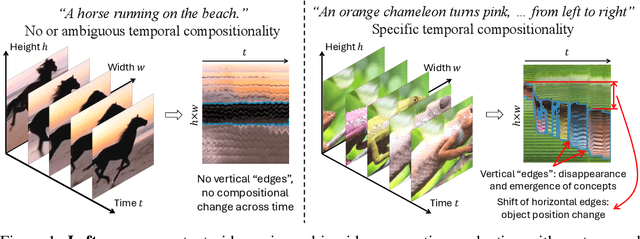TC-Bench: Benchmarking Temporal Compositionality in Text-to-Video and Image-to-Video Generation
Paper and Code
Jun 12, 2024



Video generation has many unique challenges beyond those of image generation. The temporal dimension introduces extensive possible variations across frames, over which consistency and continuity may be violated. In this study, we move beyond evaluating simple actions and argue that generated videos should incorporate the emergence of new concepts and their relation transitions like in real-world videos as time progresses. To assess the Temporal Compositionality of video generation models, we propose TC-Bench, a benchmark of meticulously crafted text prompts, corresponding ground truth videos, and robust evaluation metrics. The prompts articulate the initial and final states of scenes, effectively reducing ambiguities for frame development and simplifying the assessment of transition completion. In addition, by collecting aligned real-world videos corresponding to the prompts, we expand TC-Bench's applicability from text-conditional models to image-conditional ones that can perform generative frame interpolation. We also develop new metrics to measure the completeness of component transitions in generated videos, which demonstrate significantly higher correlations with human judgments than existing metrics. Our comprehensive experimental results reveal that most video generators achieve less than 20% of the compositional changes, highlighting enormous space for future improvement. Our analysis indicates that current video generation models struggle to interpret descriptions of compositional changes and synthesize various components across different time steps.
 Add to Chrome
Add to Chrome Add to Firefox
Add to Firefox Add to Edge
Add to Edge